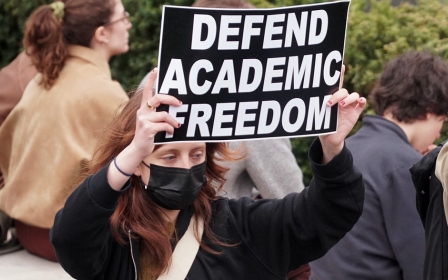Pro-Israel Columbia professor accused of harassment prevented from accessing main campus

Columbia University has deactivated the swipe card of a pro-Israel professor accused of harassing pro-Palestinian students amid rising tensions between the two camps on campus.
“They are not letting me on main campus,” Israel-born Shai Davidai, an assistant professor at Columbia Business School, told pro-Israel supporters clustered outside the school’s campus on Monday.
“Everybody, my card has been deactivated,” Davidai yelled to supporters gathered outside the campus gates. “I am a professor here, I have a right to be everywhere on campus.”
Davidai confronted Cas Holloway, Columbia's chief operating officer. “Over here we’ve got the COO of Columbia….I have not just a civil right as a Jewish person to be on campus. I have a right as a professor to be on campus.”
A group of Davidai’s supporters waving Israeli flags shouted, “Shame on you”.
Stay informed with MEE's newsletters
Sign up to get the latest alerts, insights and analysis, starting with Turkey Unpacked
According to Davidai, the decision was taken for his own safety, and users on the social media platform X pointed out that he still had access to parts of the campus where his department was located. Others said he was not given access to the main campus because he posed a threat to students.
Davidai and Columbia University didn't respond to MEE's request for comment by the time of publication.
Davidai, who teaches, “decision making & negotiations, leadership & organizational behavior”, according to his biography on Columbia Business School’s website, has been accused of harassing pro-Palestinian students.
“Under the guise of fighting antisemitism, he uses his Twitter and Instagram accounts to incite harassment and violence against [pro-Palestine students of color],” an online petition demanding Columbia fire Davidai, alleges.
According to the petition, which has garnered almost 11,000 signatures, Shai claims that any opposition towards him is "antisemitic" and engages in “doxing” or publishing private or public information about students to punish them for their political views.
"The issue is not with Shai’s individual political beliefs, the issue is how he uses personal social media accounts to target, harass, and bully students, including Palestinian students who have lost family members in Gaza,” the petition said.
In an i24 news interview posted to X on Monday, Shai said that “we are seeing terrorism”, describing pro-Palestinian protests over the weekend against Israel’s war on Gaza.
In the interview he criticised Columbia’s Arab-American president, Nemat Minouche Shafik, saying she “supports Hamas”.
Shai also took to social media to demand that New York’s National Guard be deployed to break up hundreds of Columbia students who staged a Vietnam-style encampment inside the main campus of the university in solidarity with Palestinians in Gaza.
The students cited the "rich legacy of student activism, from anti-Vietnam War protests in 1968 to being the first Ivy League school to divest from Apartheid South Africa in 1985” as their motivation for the sit-in.
During the Vietnam War, National Guard troops were deployed to break up student protests, including Kent State in 1970 when four unarmed college students were killed.
On Thursday, university authorities called police to break up the protests, leading to more than 100 arrests. The move sparked a firestorm of more pro-Palestinian sentiment, with protestors coming out in force over the weekend and more demonstrations erupting at the Massachusetts Institute of Technology, the University of Michigan, and Yale University.
Ivy League schools have been riled by tensions between pro-Palestinian and pro-Israeli students and teachers since the Hamas-led 7 October attacks on southern Israel killed about 1,200 people and saw more than 200 hostages taken to Gaza.
In retaliation, Israel launched a ferocious assault on the besieged enclave killing more than 34,000 Palestinians, mainly women and children.
Middle East Eye delivers independent and unrivalled coverage and analysis of the Middle East, North Africa and beyond. To learn more about republishing this content and the associated fees, please fill out this form. More about MEE can be found here.



